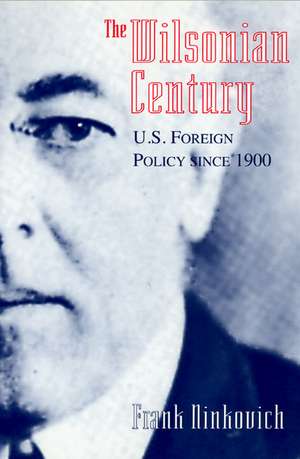The Wilsonian Century: U.S. Foreign Policy since 1900
Autor Frank Ninkovichen Limba Engleză Paperback – 10 iun 2001
For most of this century, American foreign policy was guided by a set of assumptions that were formulated during World War I by President Woodrow Wilson. In this incisive reexamination, Frank Ninkovich argues that the Wilsonian outlook, far from being a crusading, idealistic doctrine, was reactive, practical, and grounded in fear. Wilson and his successors believed it absolutely essential to guard against world war or global domination, with the underlying aim of safeguarding and nurturing political harmony and commercial cooperation among the great powers. As the world entered a period of unprecedented turbulence, Wilsonianism became a "crisis internationalism" dedicated to preserving the benign vision of "normal internationalism" with which the United States entered the twentieth century.
In the process of describing Wilson's legacy, Ninkovich reinterprets most of the twentieth century's main foreign policy developments. He views the 1920s, for example, not as an isolationist period but as a reversion to Taft's Dollar Diplomacy. The Cold War, with its faraway military interventions, illustrates Wilsonian America's preoccupation with achieving a cohesive world opinion and its abandonment of traditional, regional conceptions of national interest.
The Wilsonian Century offers a striking alternative to traditional interest-based interpretations of U.S. foreign policy. In revising the usual view of Wilson's contribution, Ninkovich shows the extraordinary degree to which Wilsonian ideas guided American policy through a century of conflict and tension.
In the process of describing Wilson's legacy, Ninkovich reinterprets most of the twentieth century's main foreign policy developments. He views the 1920s, for example, not as an isolationist period but as a reversion to Taft's Dollar Diplomacy. The Cold War, with its faraway military interventions, illustrates Wilsonian America's preoccupation with achieving a cohesive world opinion and its abandonment of traditional, regional conceptions of national interest.
The Wilsonian Century offers a striking alternative to traditional interest-based interpretations of U.S. foreign policy. In revising the usual view of Wilson's contribution, Ninkovich shows the extraordinary degree to which Wilsonian ideas guided American policy through a century of conflict and tension.
Preț: 240.80 lei
Nou
Puncte Express: 361
Preț estimativ în valută:
46.08€ • 50.25$ • 38.85£
46.08€ • 50.25$ • 38.85£
Carte tipărită la comandă
Livrare economică 24 aprilie-08 mai
Preluare comenzi: 021 569.72.76
Specificații
ISBN-13: 9780226581361
ISBN-10: 0226581365
Pagini: 330
Dimensiuni: 152 x 229 x 25 mm
Greutate: 0.46 kg
Ediția:1
Editura: University of Chicago Press
Colecția University of Chicago Press
ISBN-10: 0226581365
Pagini: 330
Dimensiuni: 152 x 229 x 25 mm
Greutate: 0.46 kg
Ediția:1
Editura: University of Chicago Press
Colecția University of Chicago Press
Notă biografică
Frank Ninkovich is a professor of history at St. John's University, New York. He is the author of several books, including Modernity and Power: A History of the Domino Theory in the Twentieth Century, also published by the University of Chicago Press.
Cuprins
Acknowledgments
Introduction: Interests versus Interpretation in U.S. Diplomatic History
1. The Emergence of Normal Internationalism, 1900-1913
2. The Great War: Wilsonianism as Crisis Internationalism
3. The 1920s: Normal Internationalism as Utopia
4. The 1930s and World War II: The Crossroads of Modern Internationalism
5. The Cold War Crisis and the Normalization of Wilsonianism
6. Wilsonianism at Work: Credibility Crises of the 1950s and 1960s
7. The Vietnam Era and the Dilemmas of Wilsonianism
8. Ideological Renewal and Exhaustion: Stumbling to the Finish Line of the Cold War
Conclusion: The Return of Normal Internationalism and the End of the Wilsonian Century
Notes
Index
Introduction: Interests versus Interpretation in U.S. Diplomatic History
1. The Emergence of Normal Internationalism, 1900-1913
2. The Great War: Wilsonianism as Crisis Internationalism
3. The 1920s: Normal Internationalism as Utopia
4. The 1930s and World War II: The Crossroads of Modern Internationalism
5. The Cold War Crisis and the Normalization of Wilsonianism
6. Wilsonianism at Work: Credibility Crises of the 1950s and 1960s
7. The Vietnam Era and the Dilemmas of Wilsonianism
8. Ideological Renewal and Exhaustion: Stumbling to the Finish Line of the Cold War
Conclusion: The Return of Normal Internationalism and the End of the Wilsonian Century
Notes
Index
